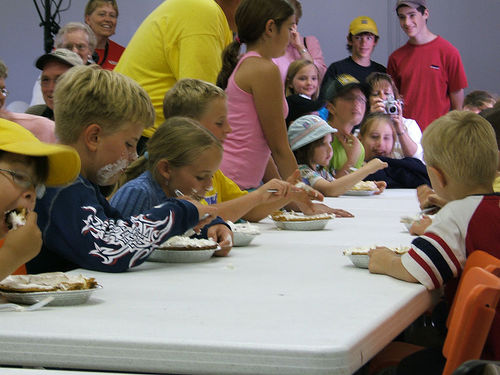Food for Thought: Why Moving the Needle on Child Obesity is So Hard

 The national conversation on obesity has dialed up the volume in the past week with the release of the Institute of Medicine's "Weight of the Nation" report, new research on the persistence of fat stigma, and a new obesity prevention report from the National Academies of Science.
The national conversation on obesity has dialed up the volume in the past week with the release of the Institute of Medicine's "Weight of the Nation" report, new research on the persistence of fat stigma, and a new obesity prevention report from the National Academies of Science.
It was in that National Academies report that I noticed one of the most cogent summaries I've seen on why it's so unbelievably hard to move the needle on child obesity. As William Dietz, CDC Director of the Division of Nutrition, Physical Activity, and Obesity notes:
First, obesity is still marked by a lack of understanding and widespread denial. Parents may acknowledge that their children are overweight, but they think other children are obese, even when their own children are at the 95th or 96th percentile (for weight). As a result, parents do not feel a sense of imminent threat.
Also, the movement lacks a specific opponent. Is the opponent the food industry, fast food, sugar-sweetened beverages, the Farm Bill, or the agricultural production system? "Until there is more focus on what the opponent is, I'm not sure that we can build the kind of support or campaign that will lead us to act collectively for change," said Dietz.
Confusion over the causes of obesity also hinders action. One message is that parents are responsible, and another is that a toxic environment is to blame
Further, the people and organizations involved in the movement still are unclear: "Who is the we?" asked Dietz. Many groups are involved, but how can these groups come together to spearhead a movement? - "Alliances for Obesity Prevention: Finding Common Ground: Workshop Summary" (pp. 49-50)
It's very much worth reading the conclusions from this workshop summary because they offer some great jumping-off points for media coverage or public conversations about childhood obesity in your community. Do parents really think other kids are obese while their own are just chubby? Whom do they blame for overweight kids – lax parents, undisciplined kids, the environment, food manufacturers? Who exactly is working on child obesity issues in your community?
Until we sort out some of these ideas, childhood obesity prevention programs won't be nearly as effective as they should be.
Resources:
Reporting on Childhood Obesity: What I Learned
CDC: Obesity and Overweight Resource Page
Alliances for Obesity Prevention: Finding Common Ground: Workshop Summary
Photo credit: Search Engine People Blog via Flickr

